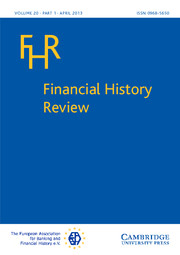
Financial History Review
Scope & Guideline
Exploring the Intersections of Finance and History
Introduction
Aims and Scopes
- Historical Analysis of Financial Systems:
The journal emphasizes the historical context of financial systems, exploring how they have evolved over time. This includes examining different eras, such as the Industrial Revolution and the Great Depression, and their impact on modern financial practices. - Interdisciplinary Research:
It encourages interdisciplinary studies that combine economics, history, sociology, and political science to understand financial phenomena. This approach allows for a richer understanding of how financial markets operate within broader societal frameworks. - Regional Financial Histories:
The journal includes studies that focus on specific geographical regions, highlighting unique financial practices and institutions. This scope aids in understanding the global financial landscape through localized studies. - Innovation in Financial Instruments:
There is a consistent focus on the development and impact of financial instruments and innovations, such as central bank digital currencies and commercial paper, which are explored in a historical context. - Impact of Legislation and Policy:
Research often investigates the effects of legislative changes and policy decisions on financial markets and institutions, illustrating how these factors shape economic environments.
Trending and Emerging
- Digital Currencies and Financial Technology:
There is a growing focus on the historical context and implications of central bank digital currencies and other financial technologies, highlighting the relevance of these modern innovations in the light of historical practices. - Investor Behavior and Market Dynamics:
Research on investor reactions to legislative changes and market dynamics is trending, showcasing an interest in behavioral finance and how historical events shape investor behavior. - Public Debt and Liquidity:
An increasing number of studies explore the role of public debt as a liquidity tool, reflecting a modern understanding of fiscal policy and its historical contexts. - Historical Perspectives on Financial Regulation:
The examination of regulatory frameworks and their evolution is gaining traction, especially in light of recent financial crises and the need for effective governance in finance. - Financial Innovations and Their Trajectories:
There is heightened interest in tracing the trajectories of financial innovations, such as commercial paper and other instruments, emphasizing their historical significance and evolution.
Declining or Waning
- Traditional Banking Practices:
Research focusing on traditional banking practices appears to be waning, as newer studies tend to emphasize the impacts of innovations and regulatory changes rather than the historical analysis of banking operations. - Gold Standards and Currency Pegs:
There seems to be a decreasing interest in studies centered around historical gold standards and currency pegs, potentially as scholars shift towards examining more contemporary monetary policies and their implications. - Early Modern Financial Crises:
While early modern financial crises were once a focal point, there is now less frequent exploration of these crises, suggesting a movement towards analyzing more recent financial crises and their causes. - Limited Focus on Microfinance:
The exploration of microfinance and its historical context has diminished, indicating a potential shift away from this niche area in favor of broader financial systems and institutional studies.
Similar Journals

Journal of Family and Economic Issues
Advancing Understanding of Financial Literacy and Family Well-Being.The Journal of Family and Economic Issues, published by Springer International Publishing AG, stands as a vital interdisciplinary platform dedicated to the exploration of economic factors impacting family dynamics and individual well-being. Operating since 1992, this esteemed journal has established a strong reputation in both the Economics and Econometrics and Social Psychology fields, proudly holding a Q2 category rank, indicative of its significant impact and relevance. With a current Scopus rank of #164 in Economics and a #78 rank in Social Psychology, it offers researchers, professionals, and students access to cutting-edge studies that bridge economic theory and real-world family issues. Notably, the journal is available in traditional subscription formats, ensuring wide dissemination of its high-quality research. By addressing pressing themes such as financial literacy, socioeconomic disparities, and parenting practices, the Journal of Family and Economic Issues continues to empower its audience with valuable insights, helping shape policy and practice within the field.

Global Economic Review
Exploring the intersection of economics and global dynamics.Global Economic Review, published by ROUTLEDGE JOURNALS, TAYLOR & FRANCIS LTD, is a pivotal academic journal that serves the fields of Business, International Management, Economics, Econometrics, and Political Science. With an ISSN of 1226-508X and an E-ISSN of 1744-3873, this esteemed journal has been disseminating vital economic research since 1996, and is set to continue until 2024. The journal holds a notable presence in academic circles, achieving a Q3 quartile ranking in the 2023 category assessments across various disciplines, including Business and International Management, Economics, and Political Science. Notably, it ranks in the top 60th percentile for Political Science and International Relations, showcasing its significant contribution to the discourse within the social sciences. Although not an open-access publication, the Global Economic Review remains accessible to a wide range of researchers, professionals, and students, acting as a critical platform for innovative and impactful economic ideas. Its rigorous peer-review process ensures the publication of high-quality research that responds to the challenges of a rapidly evolving global economy. Scholars seeking to engage with pertinent economic issues will find this journal to be an invaluable resource.
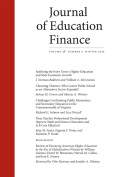
Journal of Education Finance
Transforming Educational Landscapes through Financial InsightsThe Journal of Education Finance is a pivotal academic platform dedicated to the intersection of education funding, policy, and administration. Published by University of Illinois Press, this journal features a robust collection of peer-reviewed articles that examine financial practices within educational institutions, aiming to enhance understanding of fiscal dynamics in the sector. With its ISSN 0098-9495 and E-ISSN 1944-6470, the journal spans research from 2005 to 2023, reflecting significant themes that shape contemporary discourse in education finance. Recognized in the Q3 category for Education and Q4 for both Finance and Public Administration in the 2023 quartiles, it is positioned within the realm of social sciences and offers critical insights that appeal to researchers, policymakers, and practitioners alike. Although not an open-access journal, it ensures prolific dissemination of knowledge crucial for driving effective financial strategies in educational contexts. With its current Scopus rankings placing it in the lower percentiles of its categories—ranked #192 in Public Administration and #1318 in Education—there remains a significant opportunity for researchers to contribute to this underrepresented field. The journal’s commitment to rigorous scholarship helps to illuminate the challenges and innovations in funding education, making it an essential resource for those dedicated to improving the educational landscape.
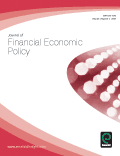
Journal of Financial Economic Policy
Bridging theory and practice in financial economic research.Journal of Financial Economic Policy is a premier academic journal published by EMERALD GROUP PUBLISHING LTD, focusing on the intersection of finance and economics. Through rigorous peer-reviewed research, the journal aims to advance understanding of financial policies and economic frameworks, addressing critical issues faced by financial markets and institutions. With an ISSN of 1757-6385 and an E-ISSN of 1757-6393, it serves as a reputable source of information for researchers, professionals, and students alike. The journal operates within the United Kingdom and is recognized for its contributions to the fields of economics and finance, achieving a Q3 category ranking in both disciplines as per the 2023 metrics. This places it within the top half of journals in its category according to Scopus ranks, demonstrating a solid impact in the academic community. Although it is not an open-access journal, the insights and analyses published are invaluable for those seeking to grasp complex financial phenomena and develop effective policies. The journal’s scope encompasses a wide range of topics relevant to contemporary finance and economic strategies, making it an essential resource for ongoing scholarly discourse and practical applications.
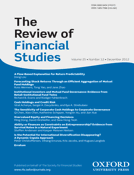
REVIEW OF FINANCIAL STUDIES
Fostering Knowledge in the World of FinanceREVIEW OF FINANCIAL STUDIES, published by Oxford University Press Inc, stands as a premier academic journal in the realms of accounting, economics, and finance. With an impressive Impact Factor that reflects its high citation rates and broad influence, this journal, with an ISSN of 0893-9454 and E-ISSN 1465-7368, is considered a cornerstone for researchers, academics, and professionals seeking to contribute to and stay updated on groundbreaking developments in financial studies. Since its inception in 1996, it has established a robust reputation, consistently ranking in the Q1 category across multiple disciplines, highlighting its elite status in the global academic landscape. The Scopus rankings further reinforce its importance, positioning it at the forefront of business, economics, and finance research. While the journal is not open access, it offers vital insights and comprehensive studies that foster a deeper understanding of contemporary financial issues and methodologies. Located in the United Kingdom, the REVIEW OF FINANCIAL STUDIES is an essential resource for those aiming to advance their knowledge and research in this dynamic field.
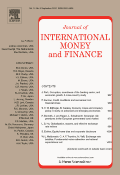
JOURNAL OF INTERNATIONAL MONEY AND FINANCE
Elevating discourse in finance and economic policy.JOURNAL OF INTERNATIONAL MONEY AND FINANCE is a premier scholarly publication dedicated to advancing the understanding of international finance and monetary economics. Published by Elsevier Science Ltd, this esteemed journal has been disseminating critical research since its inception in 1982 and will continue to contribute to the field through 2024. With a strong international presence and headquarters in the United Kingdom, the journal boasts an impressive collection of articles that explore significant trends, challenges, and innovations in the areas of economics and finance. Recognized for its impact, it ranks in the top quartile (Q1) in both the Economics and Econometrics and Finance categories as of 2023, signifying its influence and relevance among peers. Researchers, professionals, and students in these disciplines can benefit from the journal's rigorous peer-review process, ensuring high-quality scholarly outputs. Though not currently an open-access journal, it provides various subscription options to foster access to groundbreaking research in the financial ecosystem.

JOURNAL OF FINANCIAL SERVICES RESEARCH
Driving impactful research in finance and economics.The JOURNAL OF FINANCIAL SERVICES RESEARCH, published by SPRINGER, serves as a critical platform for scholarly discourse in the fields of finance, accounting, and econometrics. With a dedicated focus on innovative research and rigorous analysis, this journal has maintained a respectable Impact Factor, placing it in the Q2 category for 2023 across multiple academic disciplines including Accounting, Economics, and Finance. Since its inception in 1987, it has contributed significantly to the advancement of knowledge and practice within financial services, making it essential reading for researchers, professionals, and students alike. The journal is based in the Netherlands and hosts contributions that address contemporary issues in financial systems, markets, and institutions. Despite its non-open access format, the journal remains highly relevant, with Scopus rankings indicating its solid position within its peer group, especially in the realms of Economics, Econometrics, and Finance. As the journal approaches its converged coverage through 2024, it aims not only to disseminate high-quality research but also to foster a deeper understanding of the dynamic financial landscape.

African Review of Economics and Finance-AREF
Connecting Scholars to Transform African EconomiesAfrican Review of Economics and Finance (AREF) is a distinguished academic journal dedicated to advancing knowledge in the fields of economics and finance within the African context. Published by PORTHOLOGOS PRESS, the journal aims to provide a platform for research that addresses critical economic and financial issues that affect Africa, promoting innovative solutions and fostering discussion among scholars and practitioners. With its ISSN 2042-1478 and E-ISSN 2410-4906, AREF has established itself as a vital resource for researchers, professionals, and students seeking to deepen their understanding of African economies. The journal’s commitment to open access ensures that its valuable research findings are readily available to a global audience, thereby enhancing visibility and engagement. Through rigorous peer-review processes and thoughtful editorial leadership, AREF contributes significantly to the discourse on economic development, policy analysis, and financial practices in the region.
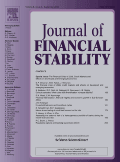
Journal of Financial Stability
Empowering insights into contemporary financial challenges.The Journal of Financial Stability, published by Elsevier Science Inc., is a renowned academic journal that serves as a premier platform for the dissemination of innovative research in the fields of finance, economics, and econometrics. With an ISSN of 1572-3089 and an E-ISSN of 1878-0962, this journal has established itself as a leader in its category, ranking Q1 for both Economics and Finance in the 2023 category quartiles. This positions it amongst the top 13% of journals in Economics and the top 35% in Finance, according to Scopus rankings. Covering a wide range of topics related to financial stability, the journal aims to fulfill its objective of advancing scholarly communication and providing researchers, professionals, and students with valuable insights into contemporary financial challenges and innovations. Operating from the Netherlands and converging from 2004 to 2024, the Journal of Financial Stability continues to contribute significantly to the academic landscape, inviting submissions that push the boundaries of knowledge and understanding in financial systems.
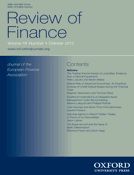
Review of Finance
Exploring the intersections of finance, accounting, and economics.The Review of Finance, published by Oxford University Press, stands as a premier academic journal in the fields of Finance, Accounting, and Economics. With an ISSN of 1572-3097 and an impressive track record stretching from 2001 to 2024, this journal is consistently recognized for its high-quality research, reflected in its Q1 rankings across key categories, including Accounting, Finance, and Economics and Econometrics. The Review of Finance is dedicated to advancing the understanding of financial phenomena through robust empirical and theoretical insights, making it an essential resource for researchers and professionals alike. Additionally, its strong Scopus rankings, placing it in the top percentiles, highlight its influence and relevance in ongoing academic discourse. Although the journal is not open access, it remains widely accessible through academic institutions, ensuring that its valuable contributions reach an extensive audience. The editorial board invites submissions that promise to further engage the academic community in the dynamic intersections of finance, accounting, and economic research.